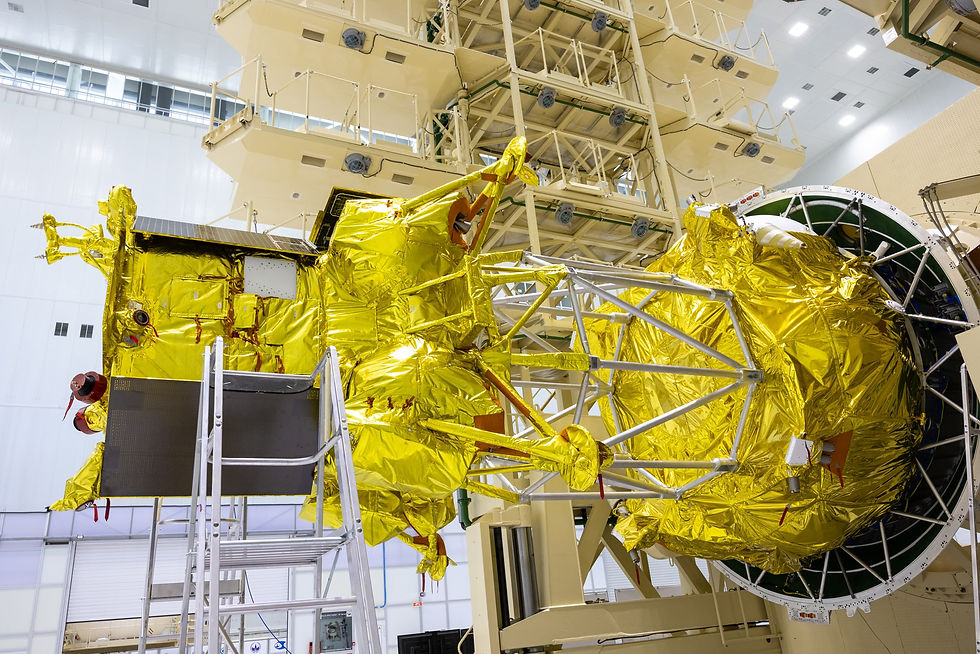Russian cargo ship docked at ISS leaks, the agency delays the Soyuz MS-23 launch
- Karthik Naren
- Feb 13, 2023
- 4 min read
Progress MS-21 lost thermal control system fluid; situation looks the same as Soyuz MS-22

After the Russian spacecraft Soyuz MS-22 had a leak in the SOTR thermal control system, leading to a major modification of the schedule of Russian manned flights to the international space station, now it was the cargo ship Progress MS-21 which had the same problem, raising doubts about the manufacturing and assembly procedures for these devices, since they are similar and produced by the same manufacturer. The pressure in the SOTR thermal control system of the instrument and engine compartment (PAO) of the Progress MS-21, coupled to the Poisk module, went to zero and all the coolant leaked. The depressurization took place on Saturday, February 11, 2023, and was preceded by the docking of another cargo ship, Progress MS-22, to the Zvezda service module of the Russian segment of the station.
According to Russian space program sources, the leak appeared after 09:40 UTC; the US was asked to observe the Progress MS-21 with the Canadarm 2 robotic arm, although this is inconveniently located; the launch of the Soyuz MS-23 will be postponed, remaining for February 20; the results of the work of the commission formed to study the Soyuz MS-22 case will be considered ; a meeting will be held at Roscosmos today.

NASA manifests
NASA announced shortly after the event: “The reason for the loss of coolant on the spacecraft Progress 82 (sic) is being investigated. The hatches between Progress 82 and the station are open, and temperatures and pressures aboard the station are normal. The crew, who have been informed of the cooling circuit leak, are in no danger and continue with normal space station operations. NASA experts are assisting their Russian counterparts in troubleshooting the coolant leak. Employees are monitoring all systems on the International Space Station and are not tracking any other issues.”
Russians talk on leakage incidents
Roscosmos will analyze the materials and technologies used in assembling the spacecraft after the Progress MS-21 depressurized on the ISS, said Sergey Krikalev, a former cosmonaut and executive director of the state corporation for manned space programs, and now an analysis of the possible cause will be carried out in terms of technology, in terms of preparation of the spacecraft, of materials that were used or technologies used to assemble this radiator, Krikalev told reporters on Saturday.
“We need to conduct an in-depth review to ensure this reason does not apply to similar projects in future releases. This is the most important task we will face, said the CEO of Roscosmos. According to him, the depressurization of the Progress MS-21 is similar to the situation that occurred in December with the Soyuz MS-22. "We will have to think about how to get information about the nature of this hole, what could be the reason," said Krikalev. He noted that visual inspection and obtaining high-quality images would narrow the scope of the search.
Earlier on Saturday, Roscosmos reported on the depressurization. According to the state company, “the temperature and pressure regime on board the station are normal, nothing threatens the life and health of the crew” – the same text used by the Americans. The Russian space agency also noted that the situation will not affect the future program of manned flights, while the causes are being investigated.
The spacecraft will come later.
The launch of Soyuz MS-23 to replace the damaged Soyuz MS-22 to the International Space Station (ISS) in unmanned mode has been postponed until the first week of March to test the thermal management system, Roscosmos head Yuri Borisov said through the press service.
"Until we make sure and get to the place of possible failure, the launch of the Soyuz MS-23 spacecraft in unmanned mode is postponed until at most the first decade of March this year," he said.
Earlier it was reported that the launch of spacecraft Soyuz MS-23 carrier rocket "Soyuz-2.1a" from Baikonur could take place on February 20, docking with the ISS was scheduled for February 22. This ship was supposed to replace Soyuz MS-22 with a damaged radiator on the station. The Russian-American crew of the damaged Soyuz MS-22 spacecraft - Roscosmos cosmonauts Sergey Prokopyev, Dmitry Petelin and NASA astronaut Francisco Rubio - were to return to Earth on it in the fall 2023.

On Dec. 15, 2022, Roscosmos reported that the outer radiator circuit of the Soyuz MS-22 spacecraft docked to the ISS had depressurized. On January 11, Borisov said that investigations confirmed that the ship was damaged by a meteoroid. The diameter of the damage on the surface of the spacecraft's instrument compartment was up to 1 mm, and it is assumed that the hole was punctured at speed by an element of space debris.
It is assumed that the damaged Soyuz MS-22 will descend to Earth in unmanned mode. On February 11, Roscosmos reported that the Progress MS-21 cargo spacecraft, docked to the ISS, leaked coolant from the thermal management system. According to Roscosmos executive director for manned space programs Sergei Krikalev, the depressurization of the Progress MS-21 spacecraft is similar to the situation that occurred in December with the Soyuz MS-22 spacecraft.
Krikalev said a commission has already begun work to analyze all possible causes of the leak.
"The most important thing for us now is to make sure that this is not some kind of systematic error, because it could affect the same problem on other spacecraft," he said.










Comments